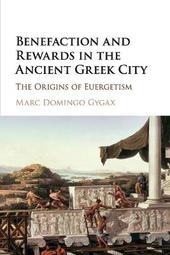
|
Benefaction and Rewards in the Ancient Greek City: The Origins of Euergetism
Paperback / softback
Main Details
| Title |
Benefaction and Rewards in the Ancient Greek City: The Origins of Euergetism
|
| Authors and Contributors |
By (author) Marc Domingo Gygax
|
| Physical Properties |
| Format:Paperback / softback | | Pages:337 | | Dimensions(mm): Height 229,Width 152 |
|
| ISBN/Barcode |
9781108940337
|
| Classifications | Dewey:938 |
|---|
| Audience | | Professional & Vocational | |
|---|
| Illustrations |
Worked examples or Exercises
|
|
Publishing Details |
| Publisher |
Cambridge University Press
|
| Imprint |
Cambridge University Press
|
| Publication Date |
17 September 2020 |
| Publication Country |
United Kingdom
|
Description
This volume presents for the first time an in-depth analysis of the origins of Greek euergetism. Derived from the Greek for 'benefactor', 'euergetism' refers to the process whereby citizens and foreigners offered voluntary services and donations to the polis that were in turn recognised as benefactions in a formal act of reciprocation. Euergetism is key to our understanding of how city-states negotiated both the internal tensions between mass and elite, and their conflicts with external powers. This study adopts the standpoint of historical anthropology and seeks to identify patterns of behaviour and social practices deeply rooted in Greek society and in the long course of Greek history. It covers more than five hundred years and will appeal to ancient historians and scholars in other fields interested in gift exchange, benefactions, philanthropy, power relationships between mass and elite, and the interplay between public discourse and social praxis.
Author Biography
Marc Domingo Gygax is Associate Professor of Classics at Princeton University and author of Untersuchungen zu den lykischen Gemeinwesen in klassischer und hellenistischer Zeit (2001). His main interests lie in ancient Greek history, historical anthropology, historical theory and modern historiography.
Reviews'Domingo Gygax competently guides us through the dense evidence to show how euergetism developed in democratic Athens ... we can be grateful to Domingo Gygax for an insightful study of this rich material ...' Onno van Nijf, Bryn Mawr Classical Review
|